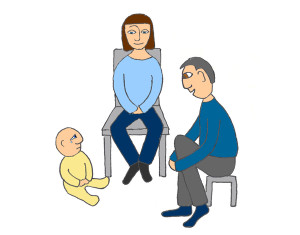
What has a psychoanalyst got to do with babies? To be true, we tend to have ideas about how childhood experiences affect our adult life. But an analyst treating a crying baby and a worried mother? After all, psychoanalysis is all about words, isn’t it? Indeed, I tended to think that way at first. Today, after years of intensive work in this area, I find many arguments why therapists should be interested in these treatments:
- Psychoanalytic treatment does not only take place through words. The analyst also pays attention to the patient’s other modes of expressions. For example, imagine a patient saying she’s happy while looking miserable. If the analyst would pay attention only to her words, he’d go quite astray, wouldn’t he?
- Becoming a parent is one of the most overwhelming events in life and often gives rise to crisis reactions. These so called postnatal depressions hit every sixth mother, perhaps equally often the father.
- Roughly every tenth baby develops so called functional symptoms; they cry all the time, refuse the breast or don’t want to let go of it, or they are sleepless or seem unhappy.
- Statistical correlations exist among these conditions in and between parent and infant. There thus seems to be an ongoing traffic between the feelings of baby and mother which may emerge, for example, in a fretting child and/or an unhappy and low-keyed mother.
- Nowadays, there are good psychotherapies. One must needs to start with an exhaustive interview. A well-educated therapist can rather quickly get an idea about the problem and offer a brief psychotherapy. Sometimes, additional treatment with SSRI medication is indicated. Hospitalization is needed very rarely.
The therapist’s challenge is to get in contact with mother and baby and get an idea about which emotions are encased in the symptoms – whether in mother and/or baby. Sometimes, one needs to focus on the relationship between the parents. Alternatively, one needs to shift focus during various phases of the therapy. Either way, the therapist uses intuition, empathy, and knowledge to help the young family.
If you want to know more about this way of working you can order material by mail to:info@psykoanalys.se. Johan Norman also wrote two scientific papers which you can order here and here.
In 2001, a course in Mother-Infant Psychoanalysis (MIP) was started by Johan Norman. In 2005, I graduated and became specialized in mother-infant psychoanalytic treatment. At the same time, the Reception Service of Mother-Infant Psychoanalysis was organized, where parents and infants can call and ask for help. You can read more here.
Now I became interested in writing about my experiences of this method. If you want to know more, go to the next page or read my paper in English here: salomonsson_mother-infant-workimplic-adult-work.
